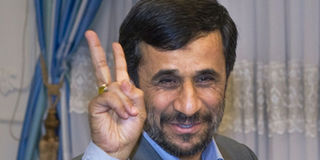Iran president's plan rejected

Iranian President Mahmoud Ahmadinejad Photo/REUTERS
TEHRAN, Tuesday
Iran’s Parliament has voted against a key plank of President Mahmoud Ahmadinejad’s subsidy reform plan, dealing him a potential blow ahead of a presidential election in June.
In what may be another sign of political trouble for the conservative president, a prominent rival comfortably defeated one of Ahmadinejad’s backers and was re-elected as head of a powerful clerical body, the Assembly of Experts, today.
Hefty subsidies
The assembly vote followed Monday’s decision by parliament to throw out of the 2009/10 budget Bill, a clause which would overhaul Iran’s system of hefty subsidies.
Critics say the government’s plan to raise energy and utility prices and compensate low-income families with direct cash payments, would only add to double-digit inflation at a time of plunging oil prices and growing economic woes.
They accuse President Ahmadinejad of squandering the windfall oil revenue Iran earned when crude prices were soaring, leaving it more vulnerable in times of need, such as now.
“The Bill would intensify existing stagflation,” said the head of parliament’s energy commission, Hamid-Reza Katouzian, quoted in the newspaper Kar-va-Kargar.
President Ahmadinejad argues his plan would help “implement justice and remove discrimination” and that change was needed more urgently now that crude has fallen by around $100 a barrel from July’s peak of $147, hitting Iran’s main source of revenue.
Iran’s interests
But a group of Iranian economists this week said the plan was against Iran’s interests and urged the assembly to reject it.
A Western diplomat said the parliamentary vote was a setback for the government but that it may be temporary.
“I think we are going to look at some form of compromise over the next couple of weeks,” he said.
President Ahmadinejad, who came to power in 2005 pledging to share out Iran’s oil wealth more fairly, plans to run for a second four-year term in the June 12 election, despite growing criticism of his economic management. (Reuters)




